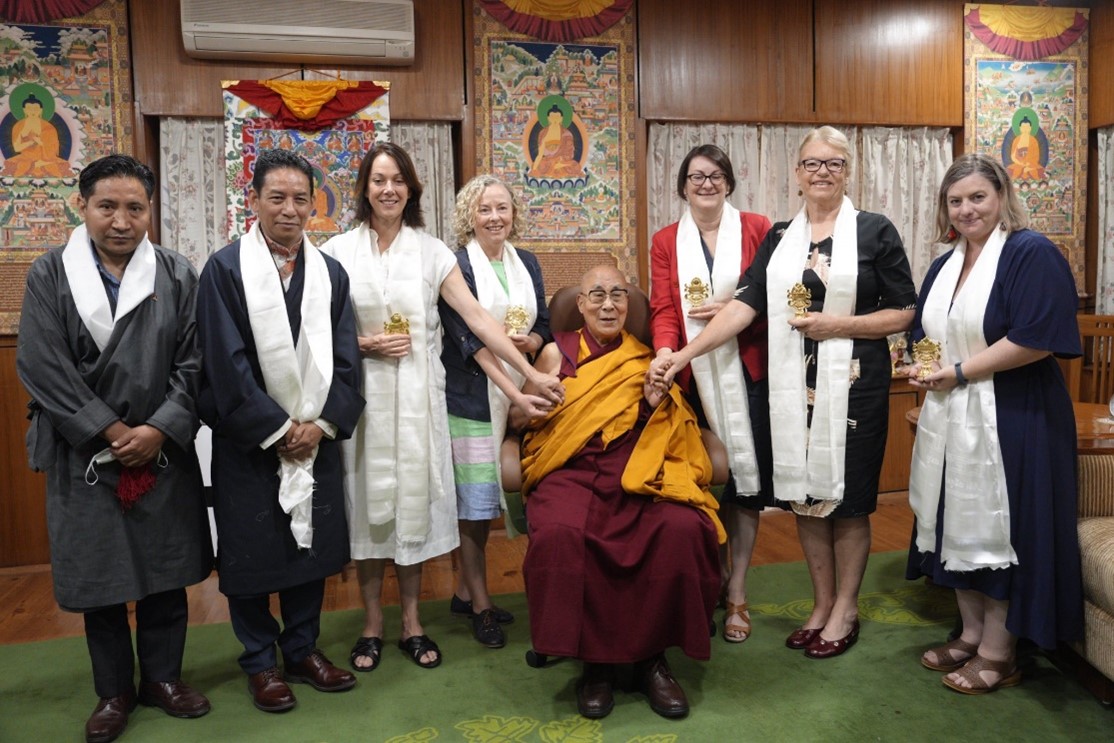Ninth politician caught not disclosing junket
In what is becoming an all to regular occurrence, another federal parliamentarian has failed to disclose their privately funded overseas trip - the ninth we've discovered in less than eight months. Open Politics looks at what's driving a culture of non-compliance and how to fix it.
Sean Johnson9 June 2023, updated 9 June 2023

Greens senator Janet Rice is the latest parliamentarian to breach their interest disclosure obligations, with Open Politics’ social media snooping uncovering she didn’t declare to the Register of Senators’ Interests a $4000 trip to Dharamshala India in April courtesy of the Central Tibetan Administration, the Tibetan government in exile.
Rice, Labor MPs Susan Templeman and Sharon Claydon, and Independent Sophie Scamps received return flights, six nights accommodation, ground transport, and food from the Tibet Information Office, an official agency of the Central Tibetan Administration.
The quad met the Dalai Lama, the local Tibetan community, and the Tibetan Parliament in Exile, and Rice later told a press conference, “It has been wonderful to get a sense of hope and inspiration from the Tibetan people here in Dharamshala . . . we will continue to work tirelessly to get justice for the people of Tibet.”

McLeod Ganj or "Little Lhasa", a beautiful hillside suburb of Dharamshala where the Dalai Lama resides. The author visited in 2009 at their own expense.
On returning to Australia, Scamps, Templeman, and Claydon all declared their sponsored trips in their statements of registrable interests.
But not Rice. Well, not until 7 June - two days after Open Politics contacted her to ask whether she accepted the Tibetan government's hospitality too.
Rice’s failure to declare the trip is a breach of the Senate register resolutions on the timely disclosure of new interests (within 35 days), meaning she could be found guilty of serious contempt of the Senate if the breach is determined to be deliberate.
Poor compliance, zero enforcement
Unfortunately Rice is no Robinson Crusoe: Open Politics has previously uncovered the following politicians who never bothered to declare junkets funded by private groups or foreign governments.
- Hollie Hughes' undeclared junket to the Holy Land
- Three politicians fail to declare overseas junkets (David Van, Peter Khalil, Deborah O’Neill)
- Taipei Confidential: More junkets exposed (Terry Young, Libby Coker)
- Transparency MP the latest caught not declaring junket (Helen Haines, Luke Gosling)
And then there’s Deputy Prime Minister Richard Marles who neglected to declare his junket to China in 2019 and failed to reveal who provided him with a free round of golf in the U.S. in 2022.
Open Politics has no evidence Rice and co knowingly didn’t declare their trips. But the large number of non-disclosures – 13% of junket recipients since 2019 - and the regularity with which other MPs declare their interests late, not at all, or provide incomplete declarations, points to a culture of casual indifference for the rules.
Anti-vaxxer @CraigKellyMP bought a new home in April but failed to disclose the purchase to the Register of Members' Interests within the required 28 days. Will the Privileges Committee take action? #auspol https://t.co/iJhhotwMRS
— Open Politics (@openpoliticsAU) December 20, 2021
This has been created, in our view, because parliament doesn’t enforce compliance.
As discussed previously, while politicians can be found guilty of serious contempt for not declaring their interests, an investigation by the House of Representatives or Senate privileges committees into a breach can only commence with a referral from an individual MP or senator (depending on the offender’s house) or their house as a whole.
And in those rare instances where investigations do occur, no real action is taken. Think Christian Porter and how the House privileges committee didn’t find him in contempt for refusing to disclose who funded his legal fees in a defamation case.
So don’t expect an investigation into Senator Rice any time soon for her less serious breach.
How to fix it
Given politicians have an inherent conflict of interest in policing their parliamentary colleagues, Open Politics believes enforcement needs to be handled by an independent parliamentary official with powers to initiate investigations into potential breaches and make public findings with recommended sanctions.
Something like the Canadian Parliament’s independent Conflict of Interest and Ethics Commissioner, who is responsible for enforcing compliance with the conflict of interest code for members of the House of Commons and the conflict of interest act for public office holders - ministers, most ministerial staff and some appointed officials.
For public office holders, the commissioner can even impose monetary penalties if interests are not fully disclosed and issue compliance orders.
Imagine a similar system in Australia. With the threat of actual consequences for non-compliance, we suspect politicians and public officials would be much more diligent about declaring all those junkets, gifts, real estate, investments, and family trusts.
We’ll have more to say about this in our upcoming proposals to reform the federal conflict of interest regime.
NB: An earlier version of this story incorrectly stated we had found nine MPs in the past six months who had not disclosed their junkets - this should have read eight months. Since March we've uncovered eight MPs who haven't disclosed a total of nine junkets.




